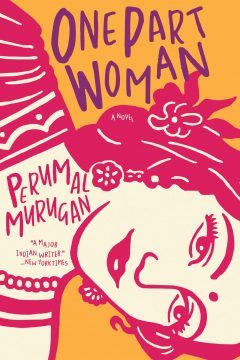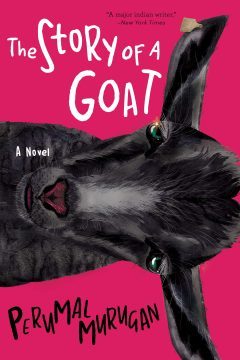by Adele A Wilby
 The translated versions from Tamil into English of Perumal Murugan’s two books, One Part Woman and the The Story of A Goat, weave stories of the complex life of the rural people of South India in an engaging and highly readable form.
The translated versions from Tamil into English of Perumal Murugan’s two books, One Part Woman and the The Story of A Goat, weave stories of the complex life of the rural people of South India in an engaging and highly readable form.
Murugan’s use of imaginary language in both books effectively brings to life the rural context and lifestyle of poor farmers. Likewise, they are infused with subtle references to the caste system in India. But while the caste system is a crucial issue that warrants the scrutiny that it gets, it is but one theme in Murugan’s complex novels; they are, in effect, thematically layered narratives and they deal with the issues common to various degrees in most societies: the relationship between the individual and society and the state,the disciplining force of social norms and expectations and the extent to which religion plays a crucial role in the lives of the people. In doing so, Murugan creates a fiction that has, at its core, a human essence which makes his novels highly accessible and relatable.
In One Part Woman, Murugan explores the sad tale of a young couple, Kali and Poona, married for twelve years, and childless. By choosing this topic as his main theme, Murugan has hit on a sensitive issue and he examines it from many cultural perspectives.
Tamil custom expects that a woman should be pregnant within the first months of marriage, and at most by the end of the second year. Failure to do so activates fertile minds and sets tongues wagging, casting aspersions, firstly over the woman’s ability to reproduce. This is not an insignificant issue for a woman in Tamil society where motherhood is central to the identity of women. Women without children are referred to as ‘barren’, an unpleasant enough word in the English language, and a highly derogatory and ugly term in the Tamil language. Indeed, such women can be considered as inauspicious and bearers of misfortune as was the case when Poona went to the fields: her proximity to newly planted seeds was thought to bring bad luck in the form of a poor harvest. However, in Murugan’s story telling he addresses the impact of childlessness on the man also. Kali ultimately becomes the butt of nasty comments and innuendo concerning his masculinity: his sexual potency and virility are called into question. ‘It is not enough if the water you take in is great, the water you send out should be top-class too’, says Kali’s friend, looking at him during a drinking session together.
The emotional pain of enduring social aspersions and deriding of their worth consequent to their childlessness compels the couple to resort to any means available in a bid for Poona to conceive. Thus, we see Poona and Kali turning to home remedies and promising every god imaginable eternal debt should Poona become pregnant. Ultimately, the idea of a second wife is put to Kali for him to at least have another shot at becoming a father, the presumption being Poona’s infertility, a proposal he outrightly rejects. Such an idea adds to the tension and thus begins the unravelling of Kali and Poona’s passionate and loving relationship. Ultimately the couple’s two mothers, themselves the perpetrators of innuendo, take the unusual step of collaborating in a bid to get Poona to accept the extreme measure for getting her pregnant: a night of sexual freedom for Poona with the young men available during the last night of the annual temple festival in the area.
Kali rejects the idea of Poona attending the festival, but relatives plot to take him away from the house while the two mothers escort an unknowing Poona to the festival only to abandon her to the throng of people and the desires of the young men at the event. What is interesting at this point is what we learn of the faithful Poona: not only do fantasies of a young man to whom she was attracted before marriage come flooding into her mind, but she quickly falls into the swing of things at the festival and seems to quite enjoy flirting with the young men eyeing off potential partners. In that sense, the author is clever at hinting that married women might find men other than their husbands attractive, an issue not easily accepted. This in itself suggests the meaning of the god for whom the festival takes place, that Maadhorubaagan is ‘one part woman’.
Under normal circumstances, a young married Tamil woman amidst a sea of young men would bring social opprobrium to the woman, but acceptance of childless women engaging in sexual freedom on such an occasion is justified by the elevation of young men to a godlike status for this one night. Should a pregnancy result from such sexual activity, it is considered a gift from god and therefore acceptable. But as Kali knew well from his participation in the event prior to his marriage, the purpose of young men attending the festival had nothing to do with religion, but simply an opportunity for them, as he put it, to ‘fuck’.
However, Murugan’s apparent radicalness in acknowledging woman’s acceptance of a sexual encounter outside marriage for the purpose of conception and Kali’s apparent sympathy for his wife in her attempts to find solutions to their childlessness is undermined by Kali resorting to a typical male response when he learns of Poona’s presence at the festival and calls her a ‘whore’. Ironically, as Poona gets a whiff of the alcohol on the breath of young men as they whirl and twirl to music at the event, we never do learn if Poona does have sex with the young man with whom she is holding hands and reference to her as a ‘whore’ maybe unjustified.
Murugan is critical of the social pressures that define people’s lives and how people respond to such pressures, even when they are happy. But it is through the unmarried uncle of Kali, Nallayyan, who has consistently defied social conventions, that we hear a more definitive radical voice. He marries, separates and has no children and feels no disgrace or loss of honour. ‘For whom do I hang my head now?’ he says in response to Kali’s suggestion that wouldn’t he feel proud if he were married and had children. We gain a clearer insight into Murugan’s thinking on this issue when we hear his voice, and not that of the narrator, in the second person sentence commenting on the social pressures that compel Kali and Poona decisions. He writes, ‘if you are always worried what others are going to say, you will always be in trouble’.
 Poona is a major female character in One Part Woman around whom Murugan has raised social issues associated with childlessness in Tamil society. In The Story of A Goat, the second of Murugan’s novels to be translated into English, a woman also takes centre stage. However, the The Story of A Goat is a more political novel that One Part Woman woven around the life of Poonachi, the kid goat, an allegorical representation of the life of a female child growing into adulthood.
Poona is a major female character in One Part Woman around whom Murugan has raised social issues associated with childlessness in Tamil society. In The Story of A Goat, the second of Murugan’s novels to be translated into English, a woman also takes centre stage. However, the The Story of A Goat is a more political novel that One Part Woman woven around the life of Poonachi, the kid goat, an allegorical representation of the life of a female child growing into adulthood.
Vivid imagery is created when Murugan uses the simile, ‘it looked as if a tree trunk shorn of all branches had uprooted itself’ to describe the awesome figure of a man carrying something in his arms as he moved towards the old man grazing his goats. He hands over a day-old female kid, lamenting that he is too poor and is unable to look after it. The reader cannot but fail to draw an analogy between the poverty of poor farmers, who, in their desperation, might give their children away to those who can care for them. This is particularly the case with female children whose parents are required to provide dowries for daughters at the time of marriage, adding further financial stress to the already poverty- stricken farmers. But as if being female was not enough, Poonachi is also black. Dark-skinned girls adds to the woes of parents; men and their families frequently prefer light-skinned women as wives and daughters-in-law. Thus, the old farmer also ponders as to how he is going to raise Poonachi, this piece of ‘dung’ that ‘wriggled like a worm’ in the basket he places her in after taking possession of her.
The presence of the kid generates new vitality in the conversations between the old farmer and his wife, and the old woman in particular grows to love Poonachi as if she were her child. Rejected by other goats and fed on gruel, Poonachi survives the early months of life and all goes well until the time comes for her to be registered with the authorities. A rare black goat with no history: how could the old couple explain her existence to the authorities without them assuming she had been stolen?
At this stage in the novel the politics become apparent. The assertion of power over the poor by the authorities is not an unusual feature of Indian social life, or indeed any society for that matter, and the novel opens out to symbolise the contradictions between the state and the people. Gathered together to register their animals at the government office ‘everyone was well versed in how they were expected to behave towards the regime. They had mouths only to keep them shut, hands only to make obeisance, knees only to bend and kneel, backs only to bend, and bodies only to shrink before the authorities.’ But of course there are always those who justify the authority of the government: the ‘government needs statistics on everyone’ because it is ‘not easy to herd goats and look after them…If we don’t keep a strict eye on them, they’ll become arrogant and do anything they want’ for there is truism in the saying that ‘when goats get together, it spells danger’.
Poonachi’s love story is also a way in which Murugan transforms his tale of a goat into social criticism. Poonachi ‘chooses’ the male goat, Poovan, to whom she is attracted and would like to mate, but the farmers tear the couple apart: he is sold off to other farmers, the inference suggesting a preference for arranged marriages as opposed to a ‘love’ marriage. Poonachi is left pining for Poovan.
Perumal Murugan’s novels may be set in South India and on one level they are brilliantly written tales of social and cultural issues in the state of Tamil Nadu, particularly One Part Woman. His switch to a more political novel in The Story of A Goat however, demonstrates the versatility of the issues the author delves into. The themes explored in the novels can be read within the local context, but his work is elevated further by addressing themes of survival and struggle that are common to humanity. It is hoped that readers will not have to wait too long before another novel by this talented and engaging author appears in English.
